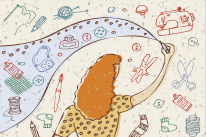
“We can judge others or we can love others, but we can’t do both at the same time.” ~Unknown
When I was eighteen, my father took his own life. I was just a baby, really, a mere freshman working on my Bachelors Degree at UMF.
There are times when I feel lost in the pain of missing him, stuck with this empty hole inside. Hovering in between confusion and anger, where the feelings consume me.
Losing my father in such a traumatic way has shown me just how deeply I can feel, how hard I can fall, how grief can overcome my entire being at times, how forgiveness can heal—and also how I can help others so they don’t need to suffer as my father did.
A military man who dealt with severe depression and PTSD, he desperately tried to find his place in this world. He tried to find comfort through his adopted family, he tried to find courage through joining the military, and he tried to find understanding by becoming a father.
He was a quiet soul who was sociably awkward in a sweet, innocent way. He radiated beams of sadness from his eyes and tried desperately to express his love to his family without actually having to verbalize it.
Monday, February 19, would become the date that measures time in my book. Time would be measured before this date and after this date.
I awoke that morning, traveled south to a friend’s home, and fell asleep on her couch after arriving.
Around 9:00pm, there was a knock on the door. There stood a Maine State Trooper and a priest. As I sat up on the couch, they walked into the living room. My heart pounded so hard I felt as if it were outside of my chest.
As they sat down, I screamed, “What’s happened? Why are you looking at me like that?”
The state trooper said, “I’m sorry to tell you this Jessica, but your father has died.”
The priest quickly intervened, “He died quietly, in his sleep, with his cat next to him. He took his own life, dear, by overdosing on medication, but he’s at peace now…”
Time stopped. My heart stopped. The pounding noise in my ears stopped. I cannot recall what they said next. I don’t remember what I even did next. I remember faintly hearing questions like, “Did you know he was ill?”, “Maybe this is a good thing considering the circumstances?”, and “Do you want to go see your mom now?”
It was all a blur. We rushed back to my family home, I ran into my mother’s arms, and suddenly the funeral planning began. Life would never be the same.
I remember feeling awkward and out of control. I worried about the stigma attached to the way he died, along with the potential judgment, the unknown pain, and the unknown future.
What looks will I get upon returning to the University? How will people act around me? Am I a statistic? Am I a survivor? My mind raced. My feelings cycled through anger, resentment, betrayal, confusion, and hurt.
How could he do this to me and our family? Didn’t he want to see me graduate college, get married, and have children? Why leave me with all these questions? This guilt? This pain? Why would he do such a thing, take the easy way out and refuse any help? He was such a great father, a strict Catholic, a military man…why would he do this?
Then I realized that all of my pain and all of my questions were centered around me, not him. My inner victim was loud and self-pitying. And that’s part of the problem. People who are in such pain from deep depression or mental illness aren’t thinking rationally.
My dad wasn’t thinking about my wedding in the future or the grandkids he would have or his next vacation; he was in pain. Period. Unbearable pain that he just couldn’t escape. He needed help. But people turned away because it can be uncomfortable to reach out, or perhaps because they thought it wasn’t their problem, or that he was just mean.
We all have the power to recognize pain in others and offer compassion instead of judgment. In doing so, we can help those in need instead of forming mistaken conclusions about them and writing them off.
Let go of the assumption that the man talking to himself on the street or the person in the straight jacket are the only ones “crazy” enough to take their own life—and that those people aren’t also worthy of compassion.
Everyone is fighting a battle you know nothing about. And everyone processes loss and hardship in different ways. How much you can handle will vastly differ than what someone else can handle.
We’re all hurting in some way, perhaps damaged due to tragedy, and yet in spite of everything, many of us rise out of bed in the morning and put a smile on our face.
Many people appear composed or happy to give the impression to the outside world that they have it all together, only to return home to feel sad and alone.
When you encounter someone in distress or look into a stranger’s eyes and see sadness, offer kindness. Don’t wait for others to be kind to you, show them how to be kind. Don’t prejudge or assume something about anyone; allow them to tell their own story—and believe them.
Listen, be present, and give others the space to be themselves.
This is what I learned from my father’s loss—that you never know who’s completely blinded by the depth of their pain, and you never know how much you could help by offering kindness and compassion.
Compassion image via Shutterstock
About Jessica Smith
Jessica Smith is a passionate entrepreneur who’s created a strong community through her meaningful blog articles and a strong presence on social media through modeling ways to embrace change. She has made a commitment to help people find the blessing in every experience. Her mission is to help others learn how to accept change, live without fear, and promote self care.












 Though I run this site, it is not mine. It's ours. It's not about me. It's about us. Your stories and your wisdom are just as meaningful as mine.
Though I run this site, it is not mine. It's ours. It's not about me. It's about us. Your stories and your wisdom are just as meaningful as mine.